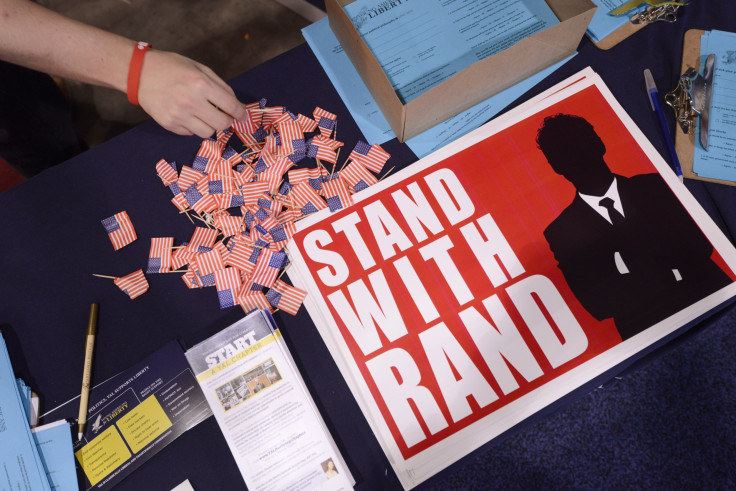Rand Paul 2016 Announcement: Campaign Platform On Foreign Policy, Drones, Taxes, Obamacare And Can He Win?

U.S. Sen. Rand Paul, R-Ky., branded himself a new kind of Republican when he officially entered the race for the Republican nomination for president in 2016 with an announcement on his website Tuesday shortly before he was to give a speech at noon in Louisville, Kentucky. Paul’s campaign will be a test both of whether Paul can leverage the organization built up by his father and three-time presidential candidate, former U.S. Rep. Ron Paul, and the tea party’s influence in presidential politics.
A libertarian and advocate for small government, Rand Paul has shifted some of his positions, particularly on foreign policy, as he geared up for his run. Paul subscribed to the view of a non-interventionist foreign policy and supported limited military action after exhausting other options, but he said the beheadings of American journalists James Foley and Steven Sotloff last summer changed his thinking and spurred him to push for airstrikes against the Islamic State group, also known as ISIS or ISIL. "I am like most Americans -- I am influenced by the beheading of Americans,” Paul said in September, according to CBS News. "I think it's going to unite the world against ISIS."
If he becomes president, the use of drones could be scaled back. Paul filibustered for nearly 13 hours on the Senate floor in 2013 to protest President Barack Obama’s use of drones in killing terror suspects, including U.S. citizens. Instead, Paul favors trying to apprehend such suspects and have them face the federal court system.
On the economy, Paul calls for a balanced budget spending cuts, including foreign aid. He also supports slashing taxes and instituting a 17 percent flat tax for individuals and businesses, according to his website. “This would bring more businesses back to America, and leave more money in the hands of hard working Americans,” he says on the site.
Paul, who was an ophthalmologist before being elected to the U.S. Senate in 2010, said repealing Obamacare would be one of his first acts if he becomes president. On his website, Paul referred to his libertarian views for part of his rationale. “As a doctor, I have had firsthand experience with the immense problems facing health care in the United States. Prior to the implementation of Obamacare, our health care system was over-regulated and in need of serious market reforms -- but Obamacare is not the answer,” he said. "Government interventions in health care have driven up the cost of coverage and decreased competition within the market. More -- not less -- freedom to choose and innovate will make sure our health care system remains the best in the world.”
Paul is the second officially declared candidate in the race for the 2016 GOP nomination after U.S. Sen. Ted Cruz, R-Texas, announced his candidacy for president last month. The field is expected to grow more crowded as former Florida Gov. Jeb Bush, Sen. Marco Rubio of Florida, New Jersey Gov. Chris Christie and Wisconsin Gov. Scott Walker mull runs. One of the advantages Paul has is he inherited the organization of his father, whose runs for the Republican nomination in 2008 and 2012 attracted fervent supporters and give Rand Paul a nationwide donor list and dedicated volunteers in all 50 states. Others who are running for the first time will have to work harder to secure that kind of network.
But while Rand Paul may enjoy grassroots support, those kinds of supporters don’t have deep pockets like the billionaires who are ready to fund candidates like Bush and Walker, said Jason Johnson, a political science professor at Hiram College in Ohio and politics editor for the hip-hop magazine the Source. “He isn’t going to be able to get through a primary where he goes against the money and infrastructure that Jeb Bush and Scott Walker have coming out of their ears,” he said.
Both Paul and Cruz benefited from tea party support in their Senate wins in 2010 and 2012. The grassroots group that formed in 2009 by railing against high taxes and bloated government spending has seen its influence grow by electing congressional candidates and elevating them to presidential contenders. “This is an exciting time for a movement that sought out to disrupt the do-nothing culture of Washington, D.C., with bold, conservative solutions,” said Sal Russo, chief strategist of the Tea Party Express in a statement.
But the movement will have its challenges in a presidential race, where Republican primary voters are going to want a candidate who can defeat likely Democratic nominee Hillary Clinton instead of a GOP nominee who closely aligns with conservative views, especially after losing the last two presidential elections. And in those years, the GOP nominated the establishment candidate over the one with grassroots support when it nominated John McCain in 2008 and Mitt Romney over Rick Santorum in 2012.
With his announcement in Louisville, followed by stops in the early primary states of Iowa, New Hampshire, South Carolina and Nevada, Paul is hoping to change that.
© Copyright IBTimes 2025. All rights reserved.






















